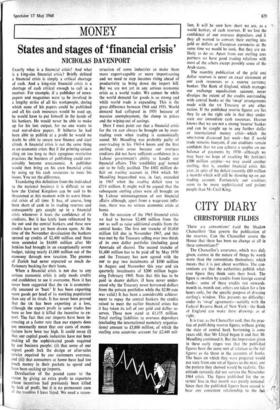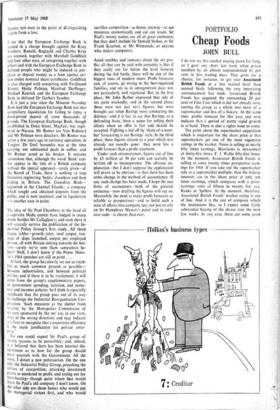CITY DIARY
CHRISTOPHER FILDES
'There are conventions' (said the Shadott Chancellor) 'that govern the publication of the reserves. Can the Chancellor assure the House that there has been no change at all in these conventions?'
The Chancellor's assurance, which was duly given, cannot in the nature of things be worth more than the conventions themselves; which means that it is just about worthless. The con- ventions are that the authorities publish what- ever figure they think suits their book. The figure is swollen by credits from foreign central banks: some of these credits run onwards. month in, month out; others are taken for a few hours only, for the specific purpose of dressing sterling's window. This presents no difficulty: under its 'swap' agreements—notably with the Federal Reserve Bank of New York—the Bank of England can make these drawings as of right.
It is true, as the Chancellor said, that the prac- tice of publishing reserve figures without giving the state of central bank borrowing is some years old; that Mr Lloyd began it and that Mt Maudling continued it. But the impression given in these early stages was that the published figures bore the same sort of relation to the full figures as do those in the accounts of banks. The basis on which they were prepared would not vary from one set of figures to the next; and the pattern they showed would be realistic. This attitude certainly did not survive the November 1964 crisis. The figure published for the re- serves' loss in that month was purely notional. Since then the published figures have ceased to bear any consistent relationship to the full
figures; not even to the point of distinguishing a gain from a loss.
I see that the European Exchange Bank is named in a charge brought against the Kray brothers. Ronald, Reginald and Charles Kray are accused, together with Marshall Goldblatt and four other men, of conspiring together with others and with the European Exchange Bank to defraud people who might be induced to pur- chase or deposit money as a loan against cer- tain stolen nominal share certificates. Goldblatt is also charged with conspiring with Ferdinand Romer, Heinz Polman, Manfred Derflinger, Michael Kenrick and the European Exchange Bank to defraud Dr Gerhart Scoeber.
It is just a year since the Moscow Narodny Bank had the European Exchange Bank put into compulsory liquidation for failing to repay a fixed-period deposit of some thousands of pounds. The European Exchange Bank, though established in Duke Street, Mayfair, was regis- tered in Nassau. Mr Romer (or Van Rohmer) and Mr Polman were directors. Mr Romer was active a few years ago in currency operations in Tangier. Dr Emil Savundra was at the time carrying out substantial deals in coffee; and Mr Romer acted as his broker. It remains anomalous that, although the word `Bank' can- not appear in the title of. a British company without the special approval—rarely given—of the Board of Trade, there is nothing to stop financiers registering 'banks' elsewhere and then trading in Britain. The Guardian - Bank— registered in the Channel Islands: a company which sought and obtained deposits from the public, and is now insolvent and in liquidation —is another case in point.
The idea of Sir Paul Chambers at the head of a capitalist Mafia cannot have lodged in many minds besides.Mr Callaghan's; and even there,it will scarcely survive the ;publication of the In- dustrial Policy. Group's 'first study. _All those league tables—growth rates, steel output, ton- nage of ships launched; output per employed person, all with Britain sinking towards the bot- tom—surely ' we've seen them somewhere be- fore? Well, I don't know if the Prime Minis- ter's 1964 speeches are still in print ...
In fact, the group has clearly set out to estab- lish as much common ground as possible— between industrialists, and between political parties; and if there is to be excitement, it will come from the group's supplementary papers, on government spending, taxation, and mone- tary and incomes policies. So I think it especially significant that the group goes out of its way to challenge the Industrial Reorganisation Cor- poration. 'Such measures as the shelter from scrutiny by the Monopolies Commission of mergers sponsored by the inc are, in our view, steps in the wrong direction, and may indicate a failure to recognise that competitive efficiency is the main justification for private enter- prise.'
No one could expect Sir Paul's group of twenty tycoons to be monolithic; and, indeed, it is believed that there has been internal dis- agreement as to how far the group should press quarrels with the Government. All the same, I detect a new polarisation. On the one side, the Industrial Policy Group, preaching the virtues of competition, attacking investment grants as unrelated to profit, and crying out for trust-busting—though quite where that would leave Sir Paul's old company I don't know. On the other side are those bosses who would put the managerial virtues first, and who would
sacrifice competition—at home, anyway—to use resources economically and cut out waste. Sir Paul's twenty names are all of great eminence; but they don't include Sir Donald Stokes, or Sir Frank Kearton, or Mr Weinstock; or anyone who makes computers.
Amid rumbles and rumours about the AEI pro- fits, all that can be said with certainty is that if they -really are far below the level forecast during the bid battle, there will be one of the biggest rows of modern times. Profit forecasts can, of course, go wrong in the best-regulated families, and AEI in its unregenerate days was not particularly well regulated. But, in the first place, Mr John Barber improved that side of AEI quite markedly; and in the second place, these were not just AEI's figures, but were brought out when Barings were conducting the defence--and it is fait to say that Barings, as a defending bank, have a name for telling their clients when an offer is fair and should be accepted. Fighting a bid off by 'think-of-a-num- ber' forecasting is not Barings' style. In the third place, these figures related to a year which was already ten months gone: they were less a profit forecast than a profit statement.
Under such circumstances, figures out of line by £5 million or 50 per cent can scarcely be written off to incompetence. The obvious ex- planation—but I don't suppose the explanation will prove to be obvious—is that there has been some change in the method of accountancy. If any such change has been made, I hope the two firms of accountants—both of the greatest eminence—now drafting the figures will say so. Meanwhile the need to make profit forecasts as reliable as prospectuses—and to build such a state of affairs into company law, not just to rely on Sir Humphrey Mynors's panel and its take- over code—is clearer than ever.







































 Previous page
Previous page